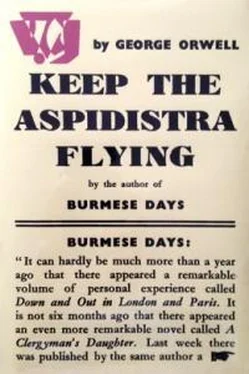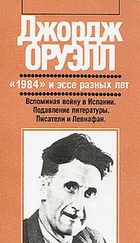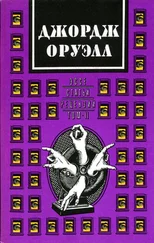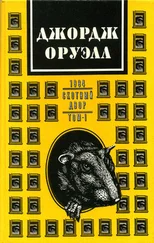One night they were to meet under the railway arches. It was a horrible January night; no mist, for once, only a vile wind that screeched round corners and flung dust and torn paper into your face. He waited for her, a small slouching figure, shabby almost to raggedness, his hair blown about by the wind. She was punctual, as usual. She ran towards him, pulled his face down, and kissed his cold cheek.
'Gordon, dear, how cold you are! Why did you come out without an overcoat?'
'My overcoat's up the spout. I thought you knew.'
'Oh, dear! Yes.'
She looked up at him, a small frown between her black brows. He looked so haggard, so despondent, there in the ill–lit archway, his face full of shadows. She wound her arm through his and pulled him out into the light.
'Let's keep walking. It's too cold to stand about. I've got something serious I want to say to you.'
'What?'
'I expect you'll be very angry with me.'
'What is it?'
'This afternoon I went and saw Mr Erskine. I asked leave to speak to him for a few minutes.'
He knew what was coming. He tried to free his arm from hers, but she held on to it.
'Well?' he said sulkily.
'I spoke to him about you. I asked him if he'd take you back. Of course he said trade was bad and they couldn't afford to take on new staff and all that. But I reminded him of what he'd said to you, and he said, Yes, he'd always thought you were very promising. And in the end he said he'd be quite ready to find a job for you if you'd come back. So you see I WAS right. They WILL give you the job.'
He did not answer. She squeezed his arm. 'So NOW what do you think about it?' she said.
'You know what I think,' he said coldly.
Secretly he was alarmed and angry. This was what he had been fearing. He had known all along that she would do it sooner or later. It made the issue more definite and his own blame clearer. He slouched on, his hands still in his coat pockets, letting her cling to his arm but not looking towards her.
'You're angry with me?' she said.
'No, I'm not. But I don't see why you had to do it—behind my back.'
That wounded her. She had had to plead very hard before she had managed to extort that promise from Mr Erskine. And it had needed all her courage to beard the managing director in his den. She had been in deadly fear that she might be sacked for doing it. But she wasn't going to tell Gordon anything of that.
'I don't think you ought to say BEHIND YOUR BACK. After all, I was only trying to help you.'
'How does it help me to get the offer of a job I wouldn't touch with a stick?'
'You mean you won't go back, even now?'
'Never.'
'Why?'
'MUST we go into it again?' he said wearily.
She squeezed his arm with all her strength and pulled him round, making him face her. There was a kind of desperation in the way she clung to him. She had made her last effort and it had failed. It was as though she could feel him receding, fading away from her like a ghost.
'You'll break my heart if you go on like this,' she said.
'I wish you wouldn't trouble about me. It would be so much simpler if you didn't.'
'But why do you have to throw your life away?'
'I tell you I can't help it. I've got to stick to my guns.'
'You know what this will mean?'
With a chill at his heart, and yet with a feeling of resignation, even of relief, he said: 'You mean we shall have to part—not see each other again?'
They had walked on, and now they emerged into the Westminster Bridge Road. The wind met them with a scream, whirling at them a cloud of dust that made both of them duck their heads. They halted again. Her small face was full of lines, and the cold wind and the cold lamplight did not improve it.
'You want to get rid of me,' he said.
'No. No. It's not exactly that.'
'But you feel we ought to part.'
'How can we go on like this?' she said desolately.
'It's difficult, I admit.'
'It's all so miserable, so hopeless! What can it ever lead to?'
'So you don't love me after all?' he said.
'I do, I do! You know I do.'
'In a way, perhaps. But not enough to go on loving me when it's certain I'll never have the money to keep you. You'll have me as a husband, but not as a lover. It's still a question of money, you see.'
'It is NOT money, Gordon! It's NOT that.'
'Yes, it's just money. There's been money between us from the start. Money, always money!'
The scene continued, but not for very much longer. Both of them were shivering with cold. There is no emotion that matters greatly when one is standing at a street corner in a biting wind. When finally they parted it was with no irrevocable farewell. She simply said, 'I must get back,' kissed him, and ran across the road to the tram–stop. Mainly with relief he watched her go. He could not stop now to ask himself whether he loved her. Simply he wanted to get away—away from the windy street, away from scenes and emotional demands, back in the frowzy solitude of his attic. If there were tears in his eyes it was only from the cold of the wind.
With Julia it was almost worse. She asked him to go and see her one evening. This was after she had heard, from Rosemary, of Mr Erksine's offer of a job. The dreadful thing with Julia was that she understood nothing, absolutely nothing, of his motives. All she understood was that a 'good' job had been offered him and that he had refused it. She implored him almost on her knees not to throw this chance away. And when he told her that his mind was made up, she wept, actually wept. That was dreadful. The poor goose–like girl, with streaks of grey in her hair, weeping without grace or dignity in her little Drage–furnished bed–sitting room! This was the death of all her hopes. She had watched the family go down and down, moneyless and childless, into grey obscurity. Gordon alone had had it in him to succeed; and he, from mad perverseness, would not. He knew what she was thinking; he had to induce in himself a kind of brutality to stand firm. It was only because of Rosemary and Julia that he cared. Ravelston did not matter, because Ravelston understood. Aunt Angela and Uncle Walter, of course, were bleating weakly at him in long, fatuous letters. But them he disregarded.
In desperation Julia asked him, what did he mean to DO now that he had flung away his last chance of succeeding in life. He answered simply, 'My poems.' He had said the same to Rosemary and to Ravelston. With Ravelston the answer had sufficed. Rosemary had no longer any belief in his poems, but she would not say so. As for Julia, his poems had never at any time meant anything to her. 'I don't see much sense in writing if you can't make money out of it,' was what she had always said. And he himself did not believe in his poems any longer. But he still struggled to 'write', at least at times. Soon after he changed his lodgings he had copied out on to clean sheets the completed portions of London Pleasures— not quite four hundred lines, he discovered. Even the labour of copying it out was a deadly bore. Yet he still worked on it occasionally; cutting out a line here, altering another there, not making or even expecting to make any progress. Before long the pages were as they had been before, a scrawled, grimy labyrinth of words. He used to carry the wad of grimy manuscript about with him in his pocket. The feeling of it there upheld him a little; after all it was a kind of achievement, demonstrable to himself though to nobody else. There it was, sole product of two years—of a thousand hours' work, it might be. He had no feeling for it any longer as a poem. The whole concept of poetry was meaningless to him now. It was only that if London Pleasures were ever finished it would be something snatched from fate, a thing created OUTSIDE the money–world. But he knew, far more clearly than before, that it never would be finished. How was it possible that any creative impulse should remain to him, in the life he was living now? As time went on, even the desire to finish London Pleasures vanished. He still carried the manuscript about in his pocket; but it was only a gesture, a symbol of his private war. He had finished for ever with that futile dream of being a 'writer'. After all, was not that too a species of ambition? He wanted to get away from all that, BELOW all that. Down, down! Into the ghost–kingdom, out of the reach of hope, out of the reach of fear! Under ground, under ground! That was where he wished to be.
Читать дальше








